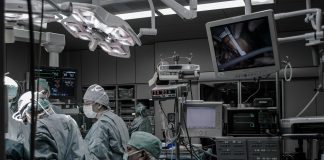King Faisal Specialist Hospital has hit headlines as the first robotic heart transplant was successfully completed there. Leading this innovative operation was Dr Feras Khaliel, who assembled his team to overlook this highly intricate surgery.
This operation was the replacement of a 16-year-old boy’s heart through a minimally invasive procedure. However, this was not performed by a surgeon, but instead carried out completely robotically.
The team ran through this procedure 7 times over 3 days to ensure its success. This surgery has set Saudia Arabia as a global leader in healthcare, with innovation and technology leading the way.
This procedure was minimally invasive, which in turn lessens recovery time and patient discomfort. These are positives that are hugely attractive not only for the patient, but for medical facilities that are under strain from overcrowding.
Reports show this hospital has ranked first out of the Middle East and North Africa for two consecutive years, out of the top 250 academic healthcare institutions worldwide. This success will only add to their impressive progression in the medical field.
This is a huge triumph within the medical and technological world, but how do people feel about this becoming a standard practice in medical facilities worldwide, and is there a true possibility of that happening?
There is mixed public opinion, as well as medical perception on the ability of these robotic surgeries.
Peter McCulloch, professor of surgery from the University of Oxford highlights how “We still don’t have a lot of proof that they’re better than old-fashioned surgeons — at least old-fashioned surgeons doing minimally invasive surgery,”. Perhaps sticking to the ideology of why fix something if it isn’t broken?
However, a Ted Talk from MD Husain Abbas highlights how technologies are being used as the ‘extended senses’ of the surgeon, with the ability to see and detect more than any individual can. He believes transformation is coming, but ‘predicting the future is futile’ as many always seem to underestimate the power and development that technology can have in a short time.
Dr Khaliel himself has given a statement thanking the support for their visionary leadership, as well as those who have aided him in “unlocking new possibilities to elevate the quality of life for patients both locally and globally.’’ This demonstrates his belief of the global impact these developments can have, and that medicine is in the midst of an exciting change.
Echoing this within the medical field is cardiac surgeon George Krasopoulos. He states, “Modern innovative approaches have now replaced older, more traditional techniques for the surgical treatment of heart disease”. He makes note to address the fears some may have regarding this technological advancement; stating “whilst the new approaches offer better results, the values of old remain, patient safety, satisfaction and improved quality of life”.
From a parenting standpoint, research shows a positive attitude around the idea of more robotic surgeries. Such as one parent stating, “I’d be fine with this. Surgeons use robotics to perform tiny, accurate microscopic movements that are just not possible manually”.
Another stated, “Never get tired, never sneeze, Can hold a particular position indefinitely, human surgeons can swap seats while the robot carries on, do only what they are told to do, what is not to like?”.
This demonstrates the benefits of a robot not having human needs or impulses, thus making it seemingly unstoppable. To which they classified as a good thing for the medical world.
However, it is far easier for those in the comfort of their own home to cast positive assumptions on the idea of this huge step forward in medicine, than in reality of being operated on robotically.
One thing that is for certain is that these medical advances prove that technology is developing further into the medical world.
Huge global positives in this field can be predicted if more successful robotic surgeries ensure minimally invasive procedures with shorter recovery




